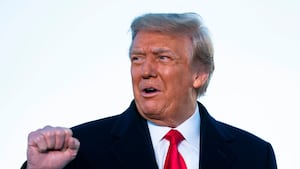Libya’s bloody civil war is spilling into American courts and, as the protagonists gear up for a courtroom fight over war crimes, what was once a conflict remote from American politics is taking on a decidedly MAGA tone.
On the surface, the courtroom battle pits Khalifa Haftar, the warlord seeking to topple Libya’s internationally recognized government, against civilians who say Haftar’s forces attacked and tortured, killed, and mutilated their civilian family members in violation of U.S. and international humanitarian law. But while the brutal civil war itself may seem remote from American politics, the domestic players aren’t entirely unfamiliar.
Representing Haftar is Jesse Binnall, a top Trump attorney who’s had plenty of experience handling lawsuits related to a different kind of insurrection—the Jan. 6 Capitol riot. And his Libyan client, an authoritarian strongman and Trump favorite trying to overthrow the government, is making an argument familiar to many of those currently suing former President Donald Trump: He’s simply too important to face his critics in court.
At the center of the suit is whether Haftar, who’s currently waging a civil war against Libya’s government, should have to sit for a Zoom deposition and answer questions about the deaths of civilians allegedly caused by pro-Haftar forces.
Haftar first came to the U.S. after he defected from former Libyan dictator Moammar Gadhafi's military in the late 1980s and began working for the CIA, providing information on the Libyan government. The former Libyan general became a U.S. citizen and settled in Virginia, where the plaintiffs say he has invested millions of dollars in real estate, including an 85-acre estate in the sleepy rural town of Keysville.
In 2011, when a civil war broke out against Gadhafi’s government, Haftar returned to the country to fight the Gadhafi government and the internationally recognized coalition that replaced it.
The plaintiffs say Hamza should be held liable under U.S. law because he’s a Virginia resident and because the Alien Tort Statute allows non-citizens to sue in American courts for violations of international law, which they claim pro-Hamza forces violated through the killing of their family members.
Binnall, whose client has argued that a deposition would force his client to choose between complying with U.S. law or risking the death penalty in Libya by “disclosing the country’s defense secrets.”
In support of that argument, Haftar’s lawyers produced a letter they said came from Libya’s ministry of defense informing their client of his liability for execution.
One slight problem: It was a fake, according to Libya’s ministry of defense. Officials said in court documents that it “was not issued by the Libyan Ministry of Defense” and that it should be considered a forged document.” (Attorneys for the plaintiff did not accuse Binnall of knowingly presented a forged letter, originally written in Arabic, but that “it appears [Haftar] may have misled his counsel” about the document).
The court hasn’t thought much of Haftar’s argument, regardless. Judge Leonie Brinkema has repeatedly ordered Haftar to sit for Zoom depositions, but Binnall’s client has responded by ghosting on at least scheduled appearances, causing Mark Zaid, the attorney representing the plaintiffs, to rack up up unnecessary legal fees and grow more exasperated with opposing counsel. His team has asked the court to force Haftar to reimburse them for over $30,000 in legal fees and $2,000 in out-of-pocket costs.
How, exactly, Haftar and Binnall got linked up remains unclear and why Haftar opted for the Virginia attorney. According to a person with knowledge of the matter, the pair were simply connected by an attorney who worked at a different law firm.
“Everyone is entitled to a full and zealous representation,” Binnall told The Daily Beast in a recent interview about his representation of Haftar. “This is America and we don’t assume guilt based on accusations or media reports. Due process is essential to freedom.”
But Haftar, whose rebellion is backed by Saudi Arabia, Egypt, and the United Arab Emirates, has long tried to court MAGAworld for support—with occasional success.
In April 2019, Trump broke with his own administration’s official policy to support Libya’s internationally recognized government in Tripoli and picked up the phone to call Haftar and praise him as his forces mounted an assault on Tripoli, causing confusion both in Libya and among Trump’s own allies.
This happened after Egyptian and Saudi leaders, who had successfully cozied up to Trump, counseled the 45th U.S. president to throw his support behind Haftar. And Trump seemed impressed with the guy—for a little while, at least. According to two former Trump administration officials, the then-president would privately refer to Haftar as, among other kudos, a “tough cookie.”
However, it didn’t take long for Trump’s affinity for the Libyan warlord to wane in 2019 and 2020, with one of the former Trump officials comparing the then-president’s rapid loss of interest in Haftar and his failed Libya campaign to Trump quickly growing bored with efforts to get rid of Nicolás Maduro in Venezuela.
Since then, Haftar has tried to balance his lobbying efforts, briefly hiring former Clinton attorney Lanny Davis to handle outreach to the Biden administration in September before the firm dropped him as a client in October.
But unlike Trump, who has successfully dodged having to face his accusers in lawsuits over alleged sexual assault, civil riots violations in the Capitol insurrection, and profiting off his own inauguration, this week Haftar signaled that he’s at least theoretically open to sit for a deposition. The Libyan warlord, Zaid told The Daily Beast, now says he could see himself sitting for questions on Nov. 9—but only on the terms of a protective order that’s yet to be negotiated.








